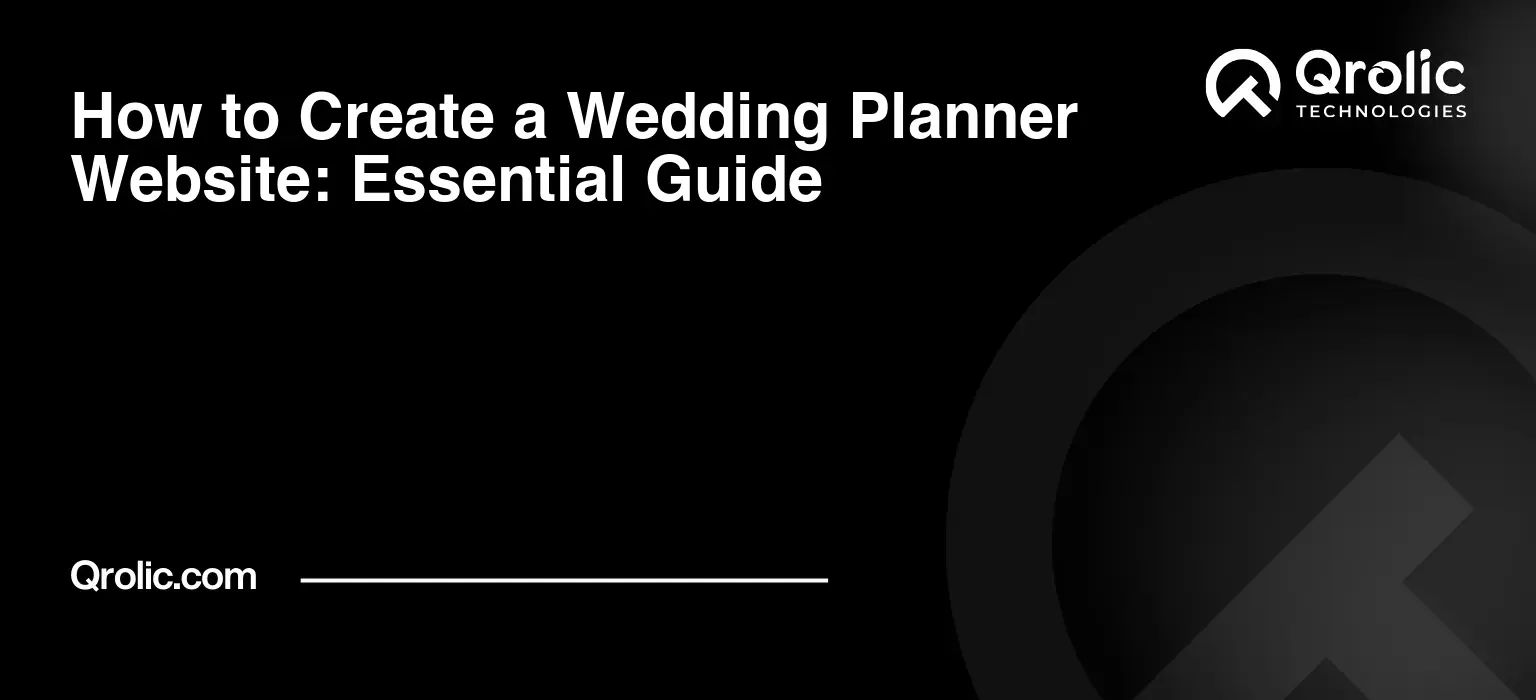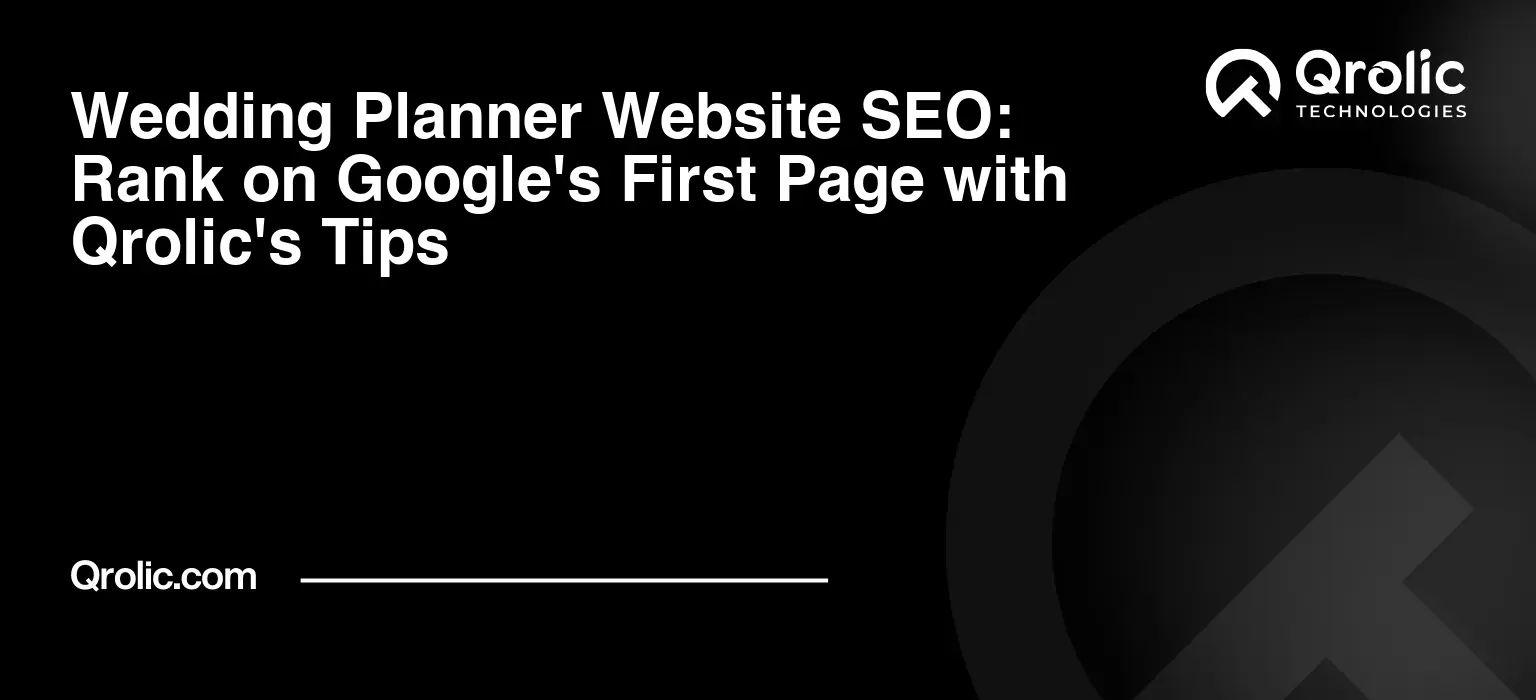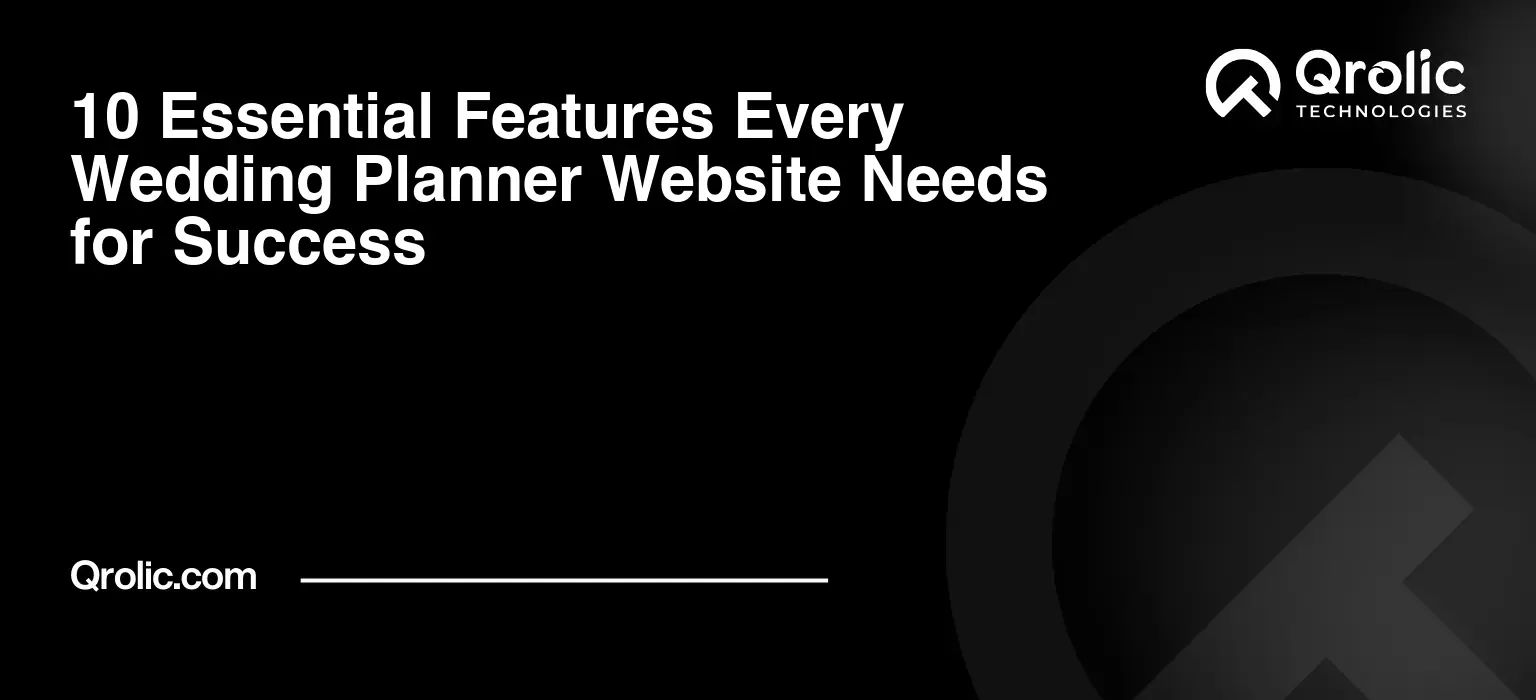Quick Summary:
- A professional website attracts clients and builds trust.
- Define your brand, then create essential web pages.
- Optimize your site for search engines and mobile users.
- Promote and continuously improve your online presence.
Table of Contents
- Why Every Wedding Planner Needs a Website (And Why Now!)
- Defining Your Brand Identity: The Foundation for Your Website
- Choosing the Right Platform: Website Builders vs. Custom Development
- Essential Website Pages: The Foundation of Your Online Presence
- Optimizing for Search Engines (SEO): Getting Found Online
- Showcasing Event Design Expertise on Your Website
- Mobile Optimization: Reaching Clients on the Go
- Analyzing Website Performance: Tracking Your Success
- Promoting Your Wedding Planner Website: Getting the Word Out
- The Power of Professionalism: Qrolic Technologies and Your Website Needs
- Continuous Improvement: Keeping Your Website Fresh and Relevant
Why Every Wedding Planner Needs a Website (And Why Now!)

The wedding industry is booming, and couples are planning their dream celebrations online more than ever. Think about it: Pinterest boards overflow with inspiration, Instagram showcases stunning venues, and review sites help couples find the perfect vendors. If you’re a wedding planner without a website, you’re missing out on a huge piece of the pie. You’re essentially invisible to a significant portion of your target audience.
-
Expanding Your Reach: From Local to Global: A website allows you to reach potential clients beyond your immediate geographical area. Someone planning a destination wedding in your region might find you through a targeted Google search.
-
Building Trust and Credibility: Your Digital Business Card: A professionally designed website instantly adds credibility to your business. It’s more than just a business card; it’s a dynamic portfolio and testament to your expertise. Think of it as your 24/7 salesperson, showcasing your skills and personality even while you sleep.
-
Showcasing Your Portfolio: Visual Proof of Your Talent: Let your work speak for itself. A website is the perfect place to display high-quality photos and videos of past weddings you’ve planned. Potential clients want to see what you can do, and a visually stunning portfolio is the best way to convince them.
-
Streamlining Communication: Answering Questions Before They’re Asked: A well-designed FAQ section, contact form, and detailed service descriptions can save you time and energy by answering common client questions upfront.
-
Generating Leads: Turning Browsers into Bookings: Your website can be a powerful lead generation tool. Offer free resources like wedding checklists or budget templates in exchange for contact information. Nurture these leads with email marketing and turn them into paying clients.
-
Controlling Your Brand Narrative: Showcasing Your Unique Style: Your website is your chance to control how potential clients perceive your brand. Showcase your unique aesthetic, values, and planning style. Let your personality shine through and attract clients who resonate with your vision.
-
Staying Competitive: Meeting Client Expectations: In today’s digital age, having a website is not a luxury; it’s an expectation. Couples expect to find wedding planners online, and if you’re not there, they’ll simply move on to the next option.
In short, a wedding planner website is a vital tool for attracting clients, building trust, and growing your business. It’s an investment that pays off in increased bookings, stronger brand recognition, and a more successful wedding planning career.
Defining Your Brand Identity: The Foundation for Your Website

Before you even think about website design, you need to define your brand identity. This is the essence of your wedding planning business – what makes you unique and appealing to your target audience. A clear brand identity will inform every aspect of your website, from the colors you choose to the language you use.
-
Identifying Your Target Audience: Who Are You Trying to Attract? Are you targeting luxury clients, budget-conscious couples, or those seeking a specific type of wedding (e.g., destination, eco-friendly, LGBTQ+)? Understanding your ideal client is crucial for crafting a website that resonates with them.
-
Defining Your Unique Selling Proposition (USP): What Sets You Apart? What do you offer that other wedding planners don’t? Do you specialize in a particular style of wedding, have exceptional vendor relationships, or offer unique planning packages? Your USP should be front and center on your website.
-
Crafting Your Brand Voice: How Do You Want to Communicate? Is your brand playful and fun, sophisticated and elegant, or down-to-earth and approachable? Your brand voice should be consistent throughout your website copy, social media posts, and client interactions.
-
Developing Your Visual Brand: Colors, Fonts, and Imagery: Your visual brand is how your business looks and feels. Choose colors, fonts, and imagery that reflect your brand personality and appeal to your target audience. Hire a professional graphic designer to create a cohesive and visually appealing brand identity.
-
Creating a Brand Style Guide: Ensuring Consistency: A brand style guide is a document that outlines your brand’s visual and verbal elements. It includes your logo, color palette, typography, imagery guidelines, and brand voice. This guide will help you maintain consistency across all your marketing materials, including your website.
- Logo Design: A memorable and professional logo is essential for brand recognition.
- Color Palette: Choose 2-3 primary colors and 1-2 accent colors that reflect your brand personality.
- Typography: Select fonts that are legible and visually appealing. Use different fonts for headings and body text.
- Imagery: Use high-quality photos and videos that are consistent with your brand aesthetic.
-
Writing Your Brand Story: Connecting with Clients on an Emotional Level: Your brand story is a narrative that explains why you started your wedding planning business and what motivates you. It should be authentic, engaging, and relatable to your target audience. Share your brand story on your website’s “About Us” page.
By investing the time and effort to define your brand identity, you’ll create a website that is not only visually appealing but also authentically represents your business and attracts the right clients.
Choosing the Right Platform: Website Builders vs. Custom Development
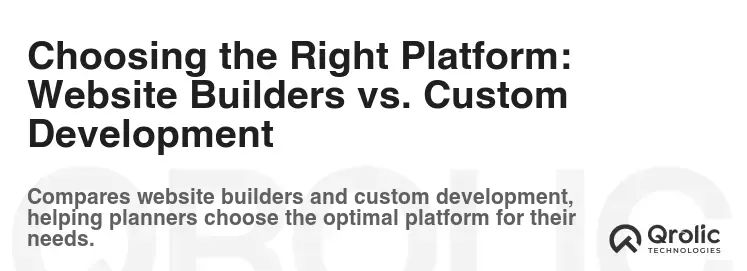
Now that you have a clear understanding of your brand, it’s time to choose a platform for building your website. You have two main options: website builders and custom development. Each option has its own advantages and disadvantages, so it’s important to weigh them carefully before making a decision.
Website Builders: User-Friendly and Affordable
Website builders are drag-and-drop platforms that allow you to create a website without any coding knowledge. They are typically more affordable and easier to use than custom development. Popular website builders include:
-
Wix: A popular choice for beginners, Wix offers a wide range of templates and features, including e-commerce capabilities and marketing tools.
-
Squarespace: Known for its sleek and modern templates, Squarespace is a great option for wedding planners who want a visually stunning website.
-
wordpress.com: A hosted version of WordPress that offers a simplified website building experience. However, it has limited customization options compared to WordPress.org.
-
Pros of Using Website Builders:
- Ease of Use: Drag-and-drop interface makes it easy to create and edit your website.
- Affordability: Typically less expensive than custom development.
- Templates: Wide range of pre-designed templates to choose from.
- Maintenance: The website builder handles all the technical aspects of website maintenance, such as security updates and server maintenance.
- Time-Saving: You can get your website up and running quickly and easily.
-
Cons of Using Website Builders:
- Limited Customization: You may not be able to customize your website as much as you would like.
- Platform Dependency: You are locked into the website builder’s platform, which means you can’t easily move your website to another platform.
- SEO Limitations: Some website builders have limitations when it comes to SEO.
- Branding: You may be required to display the website builder’s branding on your website.
-
Custom Development: Maximum Control and Flexibility
Custom development involves hiring a web developer to build your website from scratch. This option gives you maximum control over the design and functionality of your website. It’s ideal for wedding planners who have specific needs and requirements that can’t be met by a website builder.
-
WordPress.org: A self-hosted version of WordPress that offers maximum flexibility and customization. You’ll need to purchase hosting and a domain name separately.
-
Pros of Using Custom Development (WordPress.org):
- Maximum Customization: You can customize every aspect of your website.
- Scalability: Your website can easily scale as your business grows.
- SEO-Friendly: WordPress is highly SEO-friendly, which can help you rank higher in search engine results.
- Ownership: You own your website and all its content.
- Plugins: Thousands of plugins are available to add functionality to your website.
-
Cons of Using Custom Development (WordPress.org):
- Cost: More expensive than using a website builder.
- Technical Skills: Requires some technical knowledge or hiring a web developer.
- Maintenance: You are responsible for website maintenance, such as security updates and backups.
- Time-Consuming: Building a website from scratch can take time.
-
The Best Option for Wedding Planners:
For most wedding planners, WordPress.org with a premium theme is the ideal solution. It offers a good balance of customization, affordability, and ease of use. You can choose from thousands of professionally designed themes specifically for wedding planners, and you can easily customize them to match your brand identity. WordPress is also highly SEO-friendly, which is crucial for attracting clients online.
Essential Website Pages: The Foundation of Your Online Presence
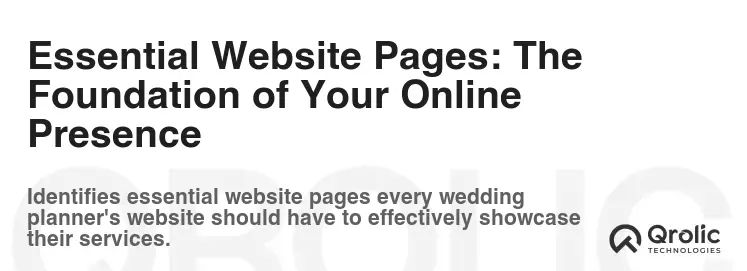
Once you’ve chosen your platform, it’s time to start building your website. Here are the essential pages that every wedding planner website should have:
-
Homepage: Making a Stellar First Impression: Your homepage is the first impression potential clients will have of your business. It should be visually appealing, clearly communicate what you do, and encourage visitors to explore the rest of your website.
- Key Elements of an Effective Homepage:
- Compelling Headline: Grab visitors’ attention with a clear and concise headline that highlights your unique selling proposition.
- High-Quality Imagery: Use stunning photos and videos of past weddings you’ve planned.
- Clear Call to Action (CTA): Tell visitors what you want them to do, such as “Book a Consultation” or “View Our Portfolio.”
- Brief Introduction: Briefly introduce your business and highlight your expertise.
- Client Testimonials: Showcase positive reviews from satisfied clients.
- Key Elements of an Effective Homepage:
-
About Us: Sharing Your Story and Building Trust: The “About Us” page is where you share your brand story and connect with potential clients on an emotional level. It’s your chance to explain why you’re passionate about wedding planning and what makes you the perfect choice for their special day.
- Key Elements of an Effective “About Us” Page:
- Your Story: Share your personal journey and explain why you became a wedding planner.
- Your Values: Highlight your core values and what’s important to you in your business.
- Your Team: Introduce your team members and their roles.
- Your Mission: State your mission and what you strive to achieve for your clients.
- Professional Photos: Include high-quality photos of yourself and your team.
- Key Elements of an Effective “About Us” Page:
-
Portfolio: Showcasing Your Best Work: Your portfolio is a visual representation of your skills and experience. It should showcase your best work and demonstrate your ability to create stunning and memorable weddings.
- Key Elements of an Effective Portfolio:
- High-Quality Photos and Videos: Use professional photos and videos of past weddings you’ve planned.
- Detailed Descriptions: Provide detailed descriptions of each wedding, including the theme, color palette, and unique elements.
- Categorization: Categorize your portfolio by style, venue, or type of wedding.
- Client Testimonials: Include testimonials from the couples whose weddings you’ve planned.
- Easy Navigation: Make it easy for visitors to browse your portfolio.
- Key Elements of an Effective Portfolio:
-
Services: Clearly Defining Your Offerings: The “Services” page should clearly outline the services you offer, including the different planning packages and à la carte options.
- Key Elements of an Effective “Services” Page:
- Detailed Descriptions: Provide detailed descriptions of each service, including what’s included and the benefits.
- Pricing Information: Be transparent about your pricing. You can either list your prices directly or provide a pricing guide.
- Package Options: Offer different planning packages to cater to different budgets and needs.
- Customization: Emphasize that your services can be customized to meet the specific needs of each client.
- Call to Action: Encourage visitors to book a consultation or request a quote.
- Key Elements of an Effective “Services” Page:
-
Blog: Sharing Your Expertise and Attracting Clients: A blog is a great way to share your expertise, attract clients through search engines, and establish yourself as a thought leader in the wedding industry.
- Key Elements of an Effective Blog:
- Informative and Engaging Content: Write blog posts that are informative, engaging, and relevant to your target audience.
- SEO Optimization: Optimize your blog posts for search engines by using relevant keywords.
- Regular Updates: Publish new blog posts regularly to keep your website fresh and attract new visitors.
- Visuals: Use high-quality images and videos to make your blog posts more visually appealing.
- Call to Action: Include a call to action at the end of each blog post, such as “Book a Consultation” or “Subscribe to Our Newsletter.”
- Key Elements of an Effective Blog:
-
Contact: Making it Easy to Get in Touch: The “Contact” page should make it easy for potential clients to get in touch with you.
- Key Elements of an Effective “Contact” Page:
- Contact Form: Include a contact form that allows visitors to send you a message directly from your website.
- Email Address: Provide your email address so visitors can contact you directly.
- Phone Number: Include your phone number so visitors can call you.
- Social Media Links: Link to your social media profiles.
- Map: If you have a physical office, include a map showing your location.
- Key Elements of an Effective “Contact” Page:
-
FAQ: Answering Common Questions Upfront: An FAQ page can save you time and energy by answering common client questions upfront.
- Key Elements of an Effective FAQ Page:
- Common Questions: Identify the most common questions clients ask you.
- Clear and Concise Answers: Provide clear and concise answers to each question.
- Categorization: Categorize your FAQs by topic.
- Search Functionality: Include a search bar so visitors can easily find the answers they’re looking for.
- Key Elements of an Effective FAQ Page:
Optimizing for Search Engines (SEO): Getting Found Online
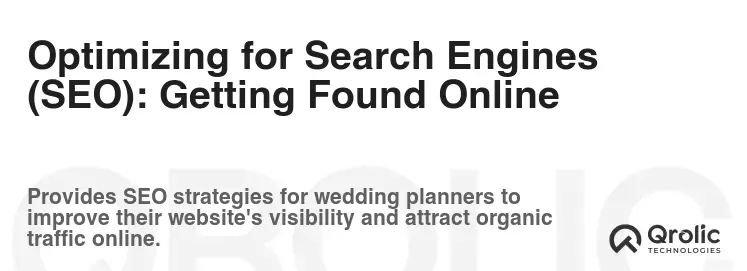
Creating a beautiful website is only half the battle. You also need to optimize it for search engines so potential clients can find you online. Search engine optimization (SEO) is the process of improving your website’s ranking in search engine results pages (SERPs).
-
Keyword Research: Identifying What Your Clients Are Searching For: The first step in SEO is keyword research. This involves identifying the keywords and phrases that your target audience is using to search for wedding planners online.
-
Tools for Keyword Research:
- Google Keyword Planner: A free tool from Google that allows you to research keywords and see their search volume and competition.
- SEMrush: A paid tool that offers a wide range of SEO features, including keyword research, competitor analysis, and site audits.
- Ahrefs: Another popular paid tool that offers similar features to SEMrush.
-
Types of Keywords:
- Head Keywords: Broad keywords with high search volume (e.g., “wedding planner”).
- Long-Tail Keywords: More specific keywords with lower search volume (e.g., “wedding planner in San Francisco”).
-
-
On-Page Optimization: Making Your Website Search Engine Friendly: On-page optimization involves optimizing the content and structure of your website to make it more search engine friendly.
- Key Elements of On-Page Optimization:
- Title Tags: Optimize your title tags with relevant keywords.
- Meta Descriptions: Write compelling meta descriptions that encourage users to click on your website in search results.
- Header Tags (H1-H6): Use header tags to structure your content and highlight important keywords.
- Image Alt Text: Add alt text to your images to describe them to search engines.
- Internal Linking: Link to other relevant pages on your website.
- Mobile-Friendliness: Ensure your website is mobile-friendly, as Google prioritizes mobile-first indexing.
- Page Speed: Optimize your website’s page speed to improve user experience and search engine rankings.
- Key Elements of On-Page Optimization:
-
Off-Page Optimization: Building Your Website’s Authority: Off-page optimization involves building your website’s authority by getting links from other reputable websites.
- Key Elements of Off-Page Optimization:
- Link Building: Get links from other websites in the wedding industry, such as wedding blogs, vendor directories, and venue websites.
- Social Media Marketing: Promote your website on social media to increase brand awareness and drive traffic.
- Online Reviews: Encourage clients to leave positive reviews on sites like Google, Yelp, and The Knot.
- Key Elements of Off-Page Optimization:
-
Local SEO: Targeting Local Clients: If you’re a wedding planner who primarily serves local clients, it’s important to optimize your website for local SEO.
- Key Elements of Local SEO:
- Google My Business: Claim and optimize your Google My Business listing.
- Local Citations: List your business in online directories like Yelp and Yellow Pages.
- Local Keywords: Use local keywords in your website content and meta descriptions.
- Reviews: Encourage clients to leave reviews on your Google My Business listing.
- Key Elements of Local SEO:
Showcasing Event Design Expertise on Your Website

For many wedding planners, event design is a core service offering. It’s crucial to showcase your event design expertise prominently on your website to attract clients looking for creative and stylish weddings.
-
Dedicated Event Design Portfolio: Create a separate section in your portfolio specifically for event design. This allows potential clients to easily see your design aesthetic and capabilities.
-
Detailed Design Descriptions: When showcasing your event design work, provide detailed descriptions of the design concept, color palette, floral arrangements, table settings, and other design elements. Explain the inspiration behind your design and how it reflects the couple’s personality and style.
-
Behind-the-Scenes Content: Share behind-the-scenes photos and videos of your event design process. This gives potential clients a glimpse into your creative process and helps them understand the amount of work and expertise that goes into creating a stunning event design.
-
Collaboration with Vendors: Highlight your collaborations with other vendors, such as florists, rental companies, and lighting designers. This showcases your ability to work effectively with a team and create a cohesive and visually appealing event.
-
Incorporate Event Design into Blog Content: Write blog posts about event design trends, tips, and inspiration. This helps establish you as an expert in the field and attracts clients who are looking for creative event design ideas.
- Example Blog Post Topics:
- “Top Event Design Trends for [Year]”
- “How to Choose the Perfect Color Palette for Your Wedding”
- “Creating a Cohesive Event Design from Ceremony to Reception”
- “DIY Event Design Ideas for Budget-Conscious Couples”
- Example Blog Post Topics:
Mobile Optimization: Reaching Clients on the Go
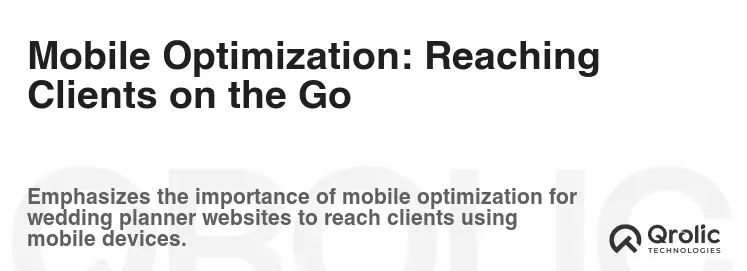
In today’s mobile-first world, it’s essential that your website is optimized for mobile devices. More and more people are using their smartphones and tablets to browse the web, so if your website isn’t mobile-friendly, you’re missing out on a significant portion of your target audience.
-
Responsive Design: Use a responsive design, which automatically adapts to different screen sizes and devices. This ensures that your website looks great on everything from desktop computers to smartphones.
-
Mobile-Friendly Navigation: Make sure your website navigation is easy to use on mobile devices. Use a hamburger menu or other mobile-friendly navigation techniques.
-
Fast Loading Speed: Optimize your website’s loading speed for mobile devices. Mobile users are more likely to abandon a website if it takes too long to load.
-
Touch-Friendly Elements: Make sure all the elements on your website are touch-friendly, such as buttons and links.
-
Mobile Testing: Test your website on different mobile devices to ensure that it looks and functions correctly.
Analyzing Website Performance: Tracking Your Success

Once your website is live, it’s important to track its performance to see how well it’s achieving your goals. Website analytics tools can provide valuable insights into your website traffic, user behavior, and conversion rates.
-
Google Analytics: A free tool from Google that provides detailed information about your website traffic, including the number of visitors, page views, bounce rate, and time on site.
-
Google Search Console: A free tool from Google that helps you monitor your website’s performance in Google search results.
-
Key Metrics to Track:
- Website Traffic: The number of visitors to your website.
- Bounce Rate: The percentage of visitors who leave your website after viewing only one page.
- Time on Site: The average amount of time visitors spend on your website.
- Conversion Rate: The percentage of visitors who complete a desired action, such as filling out a contact form or booking a consultation.
- Keyword Rankings: The position of your website in search engine results for specific keywords.
-
Using Data to Improve Your Website: Use the data you collect to identify areas for improvement on your website. For example, if you notice that your bounce rate is high, you may need to improve your website’s content or design. If you notice that your conversion rate is low, you may need to optimize your call to actions or pricing.
Promoting Your Wedding Planner Website: Getting the Word Out

Having a great website is only the first step. You also need to promote it to get the word out and attract potential clients.
-
Social Media Marketing: Use social media to promote your website and share your content. Focus on platforms like Instagram, Pinterest, and Facebook, which are popular with couples planning their weddings.
-
Email Marketing: Build an email list and send out regular newsletters to promote your website and services.
-
Online Advertising: Consider using online advertising platforms like Google Ads and Facebook Ads to reach a wider audience.
-
Networking: Attend wedding industry events and network with other vendors. Share your website with them and ask them to spread the word.
-
Partnerships: Partner with other businesses in the wedding industry, such as venues, photographers, and florists. Cross-promote each other’s services on your websites and social media channels.
The Power of Professionalism: Qrolic Technologies and Your Website Needs

Creating a truly effective wedding planner website requires a blend of creativity, technical expertise, and a deep understanding of the wedding industry. While DIY options are available, partnering with a professional Web Development company like Qrolic Technologies can offer significant advantages.
Qrolic Technologies (https://qrolic.com/) provides comprehensive web development services tailored to the unique needs of wedding planners. We understand the importance of a visually stunning, user-friendly, and SEO-optimized website in attracting and converting potential clients.
- Custom Design and Development: We create custom website designs that reflect your brand identity and showcase your unique style.
- Mobile-First Approach: We ensure your website is fully responsive and optimized for mobile devices.
- SEO Optimization: We implement the latest SEO best practices to help you rank higher in search engine results.
- Content Management Systems (CMS): We build websites on user-friendly CMS platforms like WordPress, allowing you to easily manage and update your content.
- Ongoing Support and Maintenance: We provide ongoing support and maintenance to ensure your website is always up-to-date and running smoothly.
Investing in professional web development services from Qrolic Technologies can save you time, money, and frustration in the long run. We can help you create a website that not only looks great but also delivers results.
Continuous Improvement: Keeping Your Website Fresh and Relevant
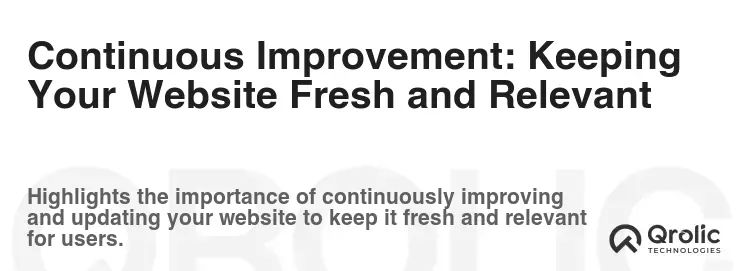
Your website is not a static entity. It should be continuously updated and improved to stay fresh, relevant, and effective.
-
Regular Content Updates: Add new content to your website regularly, such as blog posts, portfolio updates, and client testimonials.
-
SEO Monitoring and Optimization: Continuously monitor your website’s SEO performance and make adjustments as needed.
-
Website Design Updates: Keep your website design up-to-date with the latest trends and technologies.
-
User Feedback: Solicit feedback from your website visitors and use it to improve your website’s usability and content.
-
Stay Up-to-Date with Industry Trends: Keep abreast of the latest trends in the wedding industry and incorporate them into your website.
By continuously improving your website, you can ensure that it remains a valuable asset for your wedding planning business for years to come.
This essential guide provides a comprehensive roadmap for creating a wedding planner website that attracts clients, showcases your expertise, and helps you grow your business. By following these steps and continuously improving your website, you can establish a strong online presence and become a leader in the wedding planning industry. Remember to leverage resources like Qrolic Technologies (https://qrolic.com/) to achieve the best possible results. Good luck!
